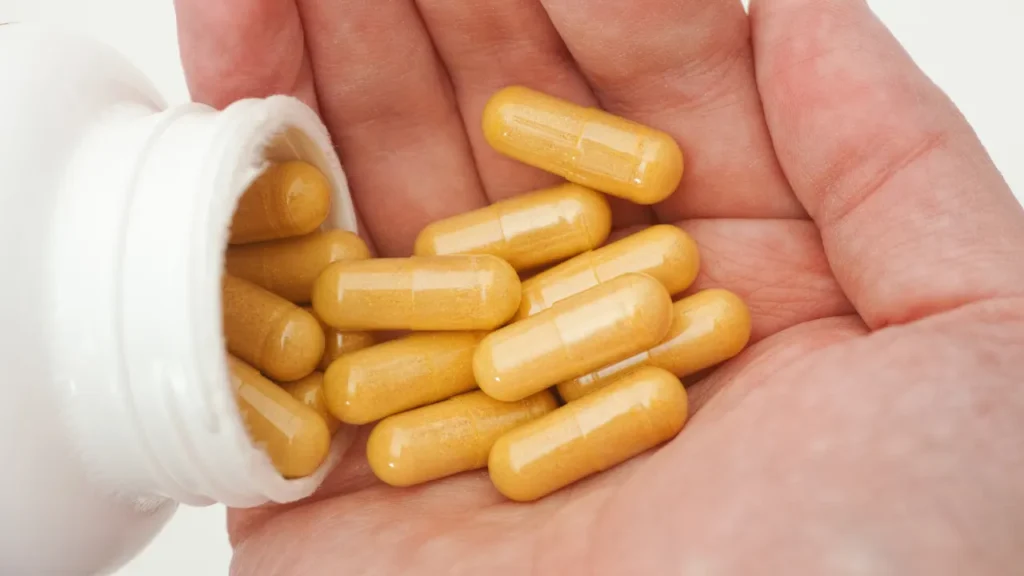Arctostaphylos uva-ursi is the scientific name for uva ursi. It is a tiny shrub with a long history of medicinal usage. It has historically been used for treating urinary tract infections due to its antibacterial qualities. But lately, attention has turned to its possible nootropic advantages. The chemistry of uva ursi, its health advantages, the ideal dosage, any negative effects, any drug interactions, and the best ways to utilize it responsibly are all covered in detail in this article.
You May Also Like:
Finding the Best Supplements for Brain Fog After COVID: 5 Top Brands Reviewed
ONNIT Supplements Antarctic Krill Oil Reviewed: A Leading Memory Support Supplement
Uva Ursi: Benefits, Dosage, Side Effects, Drug Interactions, and Other Important Information is an original (NootropicsPlanet) article.
Nature of Uva Ursi
Uva ursi is a low-growing evergreen shrub that grows wild in frigid climates in North America, Europe, and Asia. Not only are its crimson berries and leathery leaves visually pleasing, but they are also a rich source of therapeutic ingredients. In particular, the leaves are gathered for their medicinal qualities, which have been used for ages in traditional medicine. Its adaptability to different soil types and environmental factors is indicative of the plant’s resilience and could be useful in a range of health applications.
Health Benefits of Uva Ursi
The interest in Uva Ursi’s effects on the brain, particularly its potential nootropic benefits, is rooted in the bioactive compounds it contains. Although direct research on Uva Ursi’s impact on cognitive functions is sparse, the known effects of its components can provide insights into its potential benefits.
Neuroprotection: Uva Ursi flavonoids may have neuroprotective properties. These substances have a reputation for combating oxidative stress, which is a key contributor to the onset of neurodegenerative illnesses including Parkinson’s and Alzheimer’s. Flavonoids have the ability to neutralize free radicals, which helps shield neurons from harm, preserving cognitive function and maybe delaying the onset of neurodegenerative illnesses.
Anti-inflammatory Effects: Neurodegenerative diseases and cognitive impairment are also influenced by chronic inflammation. Because of the flavonoid content in uva ursi, it has anti-inflammatory qualities that can help lessen inflammation in the brain. This can preserve cognitive processes and may alleviate signs of exhaustion and brain fog, improving concentration and mental clarity.
Antimicrobial Benefits: The antibacterial qualities of uva ursi, which are mainly attributed to the conversion of arbutin to hydroquinone, may indirectly promote brain health even though they are not directly linked to cognitive enhancement. Keeping the urinary tract healthy and avoiding infections might improve general health and cognitive function.
Although there hasn’t been much direct research on Uva Ursi’s nootropic effects, its constituents which are flavonoids and anti-inflammatory compounds offer intriguing pathways for neuroprotection and cognitive enhancement.

Chemistry of Uva Ursi
Uva Ursi’s chemistry is intricate and centered on a number of bioactive substances that give it its therapeutic qualities. Arbutin, a hydroquinone glycoside found in large amounts in the plant’s leaves, is the most noteworthy of these substances. Arbutin is metabolized to hydroquinone in the liver and intestines after consumption. The plant’s antibacterial properties, especially in the urinary system, are attributed to hydroquinone. However, research on this compound’s potential impacts on the brain and cognitive processes is an ongoing effort.
Uva Ursi has several additional phenolic chemicals, including myricetin, quercetin, and methyl-arbutin, in addition to arbutin. Due to their well-known anti-inflammatory and antioxidant characteristics, these flavonoid chemicals may have neuroprotective benefits by reducing inflammation and oxidative stress in the brain.
Another important class of chemicals present in Uva Ursi is tannins, which have astringent qualities. Their antibacterial and inflammation-modulating properties also play a major role in the treatment of urinary tract infections. Nonetheless, their influence on cognitive health is less clear and needs more research.
Comprehending the molecular makeup of Uva Ursi is essential to recognizing its possible health advantages and modes of action.
Physiological Mechanism of Action of Uva Ursi
Uva Ursi has long been associated with advantages for the urinary tract, but there it also indirectly affects cognition and mental function. First, flavonoids’ anti-inflammatory qualities contribute to neuroprotection and can help in brain inflammation in which cognitive function is impeded. Second, although the precise mechanisms are still unknown, the metabolic conversion of arbutin to hydroquinone may have an impact on how the central nervous system functions.


Optimal Dosage of Uva Ursi
It is difficult to determine the ideal dosage of Uva Ursi for nootropic effects because there aren’t many studies that specifically address this topic. However, doses of 250–500 mg of Uva Ursi extract, taken three times a day, have been recommended for urinary tract health. It’s crucial to remember that uva ursi should only be used sparingly and for brief periods of time because it converts arbutin into hydroquinone which is a potentially harmful substance in large doses.
Side Effects of Uva Ursi
Despite its benefits, Uva Ursi can cause undesirable side effects, particularly when consumed in high doses or over extended periods. The most significant concern is the potential toxicity of hydroquinone, which can lead to liver damage, difficulty breathing, nausea, and vomiting. Additionally, its astringent properties can cause gastrointestinal discomfort.
Potential Substance Interactions with Uva Ursi
Given its chemical composition, Uva Ursi may interact with several substances and medications, potentially leading to adverse effects or diminished efficacy of treatment. The most notable interactions include:
- Diuretics: Uva Ursi has diuretic properties, which can enhance the effects of pharmaceutical diuretics, potentially leading to dehydration and electrolyte imbalances. Individuals using diuretics for hypertension or other conditions should exercise caution and consult healthcare providers before using Uva Ursi.
- Drugs Affecting Liver Enzymes: As arbutin is metabolized in the liver to produce hydroquinone, there is a potential interaction with medications that are also metabolized by the liver. Uva Ursi could either inhibit or induce the activity of liver enzymes, affecting the metabolism of other drugs and potentially leading to altered drug levels and effects. This involves a wide range of medications, such as some antidepressants, antiepileptics, and statins.
- Anticoagulants and Antiplatelet Drugs: Although not directly reported, Uva Ursi has the potential for bleeding risk due to components like flavonoids, which carry anticoagulant properties. This could theoretically enhance the effects of anticoagulant and antiplatelet medications, increasing the risk of bleeding.
- Substances Affecting Blood Sugar Levels: Given the potential effects of Uva Ursi and its components on metabolism, there may be interactions with medications or supplements that affect blood sugar levels. While direct evidence is lacking, individuals with diabetes or hypoglycemia should use Uva Ursi cautiously and monitor blood sugar levels closely.
Due to these potential interactions, it is vital for you to consult healthcare professionals if you are considering Uva Ursi as a dietary supplement or nootropic supplement. This is especially important if you have any pre-existing conditions or are taking medications that could interact with Uva Ursi’s components.


Best Responsible Use of Uva Ursi
The responsible use of Uva Ursi is crucial in maximizing its benefits while minimizing potential risks, especially considering its complex chemistry and the potential for substance interactions. Adhering to the following guidelines can help ensure safe and effective use:
- Consultation with Healthcare Professionals: Before incorporating Uva Ursi into any health regimen, especially for cognitive enhancement, it is essential to consult with a healthcare professional.
- Adherence to Recommended Dosages: It is crucial to follow the recommended dosages for Uva Ursi to avoid the toxic effects of hydroquinone. While specific dosages for cognitive enhancement are not well-established, using Uva Ursi within the guidelines for urinary tract health (typically 250 to 500 mg of extract, three times daily) and for short periods (not exceeding one week) can help mitigate risks.
- Monitoring for Side Effects: Users should be vigilant for any signs of adverse effects, such as gastrointestinal discomfort, liver toxicity symptoms (e.g., jaundice, fatigue), or allergic reactions. If any adverse effects are observed, stop using immediately and seek medical help.
- Awareness of Potential Interactions: Given the potential for interactions with medications and other supplements, users should be aware of what they are currently taking and how it might interact with Uva Ursi. This includes over-the-counter medications, prescription drugs, and other herbal supplements.
- Educating Oneself on Uva Ursi: Understanding the nature, benefits, and risks associated with Uva Ursi can empower individuals to make informed decisions about its use. Accessing reputable sources of information and staying updated on the latest research can contribute to safer usage practices.
- Responsible Sourcing: Finally, obtaining Uva Ursi from reputable sources that ensure purity and quality is important.
Uva Ursi:
Conclusion
Coming from a long history of medicinal use, Uva ursi is derived from the leaves of the bearberry plant and has proven its efficacy in treating urinary tract infections. Recently the potential of uva ursi has shifted to its use as a nootropic supplement. Although the direct link between uva ursi and its cognitive ability is yet to be illustrated in research, the known effects can provide some insights into its potential.
Uva ursi contains bioactive substances like flavonoids which have neuroprotective properties. These can help combat oxidative stress and hopefully decrease the chances of the onset of neurodegenerative illnesses. However, due to potential side effects and interactions which include gastrointestinal upset and liver toxicity, it’s important to use uva ursi supplements under the guidance of a healthcare provider. Additionally, you should also ensure proper dosage and quality of the supplement are essential for maximizing benefits and minimizing risks.


References:
- Uva-Ursi Extract and Ibuprofen as Alternative Treatments for Uncomplicated Urinary Tract Infection in Women (ATAFUTI): A Factorial Randomized Trial. Retrieved from:https://pubmed.ncbi.nlm.nih.gov/30685500/
- Herbal Treatment with Uva Ursi Extract Versus Fosfomycin in Women with Uncomplicated Urinary Tract Infection in Primary Care: A Randomized Controlled Trial. Retrieved from:https://pubmed.ncbi.nlm.nih.gov/34111592/
- Uva-Ursi Extract and Ibuprofen as Alternative Treatments of Adult Female Urinary Tract Infection (ATAFUTI): Study Protocol for A Randomised Controlled Trial. Retrieved from:https://pubmed.ncbi.nlm.nih.gov/28886751/
Important Note: The information contained in this article is for general informational purposes only, and should not be construed as health or medical advice, nor is it intended to diagnose, prevent, treat, or cure any disease or health condition. Before embarking on any diet, fitness regimen, or program of nutritional supplementation, it is advisable to consult your healthcare professional in order to determine its safety and probable efficacy in terms of your individual state of health.
Regarding Nutritional Supplements Or Other Non-Prescription Health Products: If any nutritional supplements or other non-prescription health products are mentioned in the foregoing article, any claims or statements made about them have not been evaluated by the U.S. Food and Drug Administration, and such nutritional supplements or other health products are not intended to diagnose, treat, cure, or prevent any disease.
